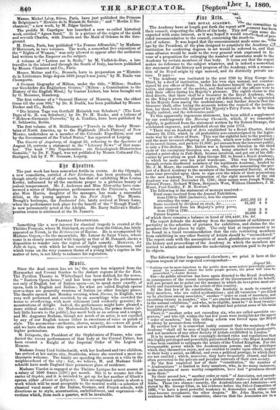'int iris. ' au THE ROYAL ACADEMY. ‘ 11 "C
2cument has been the co The
their council, respecting the affairs of the body. This clox - expected with some interest, as it was hoped it would coktrial,,,iiikeds°Ine The Academy have at length put forth the report OPW pro": de- cided recommendation to the council, concerning the much-ta.. - ject of reform. It was hoped that the announcement made some mo-liths_s ago by the President, of the plan designed to constitute the Academy n-LL, institution for conferring degrees in art would be ' referred to, and that some allusion would be made to the very general wish expressed in fa- vour of a proposition for enlarging the number of associates made to the Academy by certain members of that body. It turns out that the report makes no reference to the subject whatever, and is indeed a somewhat dry statement of the history and progress of the Academy, with a reasser- tion of its Royal origin by sign manual, and its distinctly private na-
ture. It says— -
" The Academy was instituted in the year 1768 by King George the Third, by a deed of institution, under his own sign manual, not counter- signed by any officer of State. In this he declares himself the patron, pro- tector, and supporter of the society, and that several of the officers were to hold their offices during his Majesty's pleasure. The eighth clause to the deed directs, that there shall be a treasurer to the Royal Academy, who, as the King is graciously pleased to pay all deficiencies, shall be appointed by his Majesty from among the academicians; and further directs that the treasurer shall., after laying the accounts before the council of the institu- tion, lay them before the Keeper of his Majesty's Privy Purse, to be by him finally audited, and the deficiencies paid." To this apparently ingenuous statement, has been added a supplement by our contemporary the Morning Chronicle, which, if we remember rightly, is gathered from the statement written by Sir Robert Strange, the celebrated engraver, and published about the year 1776. "There was an Academy of Arts established by a Royal Charter, dated January 26, 1765, which in all probability was countersigned in the legiti- mate y by an officer of State. te This was the rightful heir to the position; and the more favoured offspring of Royalty, which now talks rather loudly of its moral claims, and pockets 11,600/. per annum from the innocent public, M is only a Fitz-Dalton. r. Dalton was a favourite librarian in the third cycle of the exemplary Georgian era, and, being attached to the arts, he started a print-shop in Pall-Mall, became involved, and got out of his diffi- culties by prevailing on good King George HI. to found a Royal Academy, to which he made over his print warehouse. This was brought about through certain disaffected members of the legitimate Academy, headed by Mr. J. M. Moser, the confidant of Dalton, who, after announcing the pro- ject of a Royal icademy to the members of the Incorporated Society, at the same time prevailed upon them to sign over the whole of their possessions to the new Academy. The resignation of the eight members of the old Academy was dated November 10, 1768 their names were Joseph Wilton, Edward Penny, Richard Wilson, Benjamin West, William Chambers, J. M. Moser, Paul Sandby, F. M. Newton." The following is the statement of moneys received—
Total sums received from the Annual Exhibition, from 1769 to 1859 (inclusive), less the expenses
attending the same £267,583 15 5
Sums received by dividend on stock, &c 91,567 8 9 Sums received from his Majesty's privy purse, from 1769 to 1780 5116 2 0
Turner bequest 20,000 0 0
of which there remains a balance in hand of 104,449/. 19s. 6d.
The report defends the Academy from the imputation of unfairness or partiality in the selection of pictures for exhibition, and claims for .the members the best places by right. The only hint at improvement is to be found in a timid recommendation that the rule restricting members from exhibiting in any other Society of Artists should be "reconsidered." The report ends with the assumption of much glorification on account of the history and proceedings of the Academy in which the members are invited to admire and maintain the undeviating attention paid to its pub- lic objects.


























 Previous page
Previous page